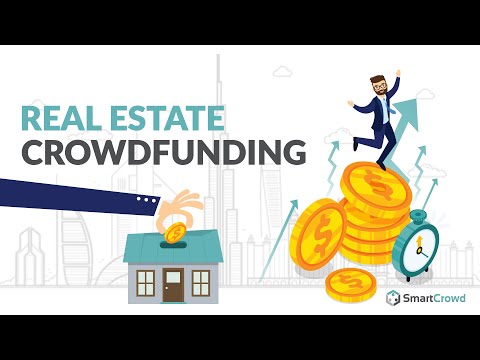In the ever-evolving world of investment, the realm of crowdfunded real estate has emerged as a beacon of innovation and opportunity. As we stride into 2024, let’s delve into the trends that are setting the stage for a seismic shift in how we interact with property investment. The allure of pooling funds with a tap on a screen, coupled with the irresistible siren call of passive income, has enticed a new crop of investors to dip their toes in these waters. But, where exactly are these ripples of change leading us?

The Rise of Blockchain-based Real Estate Crowdfunding Platforms
Blockchain: a term that both baffles and intrigues. But here’s the kicker—it’s changing the game for crowdfunded real estate. Imagine a world where every transaction, every handshake agreement, is as transparent as that pristine glass house by the beach — it’s the world blockchain is birthing.

Eco-Friendly Projects Taking Center Stage in Crowdfunded Real Estate
Who doesn’t want to save the planet while making a buck or two? Enter eco-friendly crowdfunded real estate projects, the green shoots sprouting in an investment field ripe for the harvest.

| **Category** | **Details** |
|---|---|
| Concept | Crowdfunded Real Estate |
| Description | The process of raising capital for real estate investments through a large pool of investors, primarily via online platforms. |
| Minimum Investment | Typically $500 – $1,000, though it can vary by platform and project. |
| Investor Qualification | Many platforms require investors to be accredited (meeting SEC income or net worth criteria). Non-accredited options are available but might have limitations. |
| Accessibility | Available through internet platforms and social media, allowing for broader participation compared to traditional real estate investment methods. |
| Investment Type | – Equity-based: Investors get shares in a property or portfolio. |
| – Debt-based: Investors receive fixed returns based on the mortgage loan provided to the property developer. | |
| Popularity | Increasingly popular among investors seeking portfolio diversification. Attracts investors of all ages and investment experience levels. |
| Capital Raising | Suitable for individuals and businesses seeking investment for real estate purchases or developments. |
| Platforms | Examples include Fundrise, RealtyMogul, Crowdstreet, PeerStreet, among others. |
| Potential Benefits | – Lower capital requirement enables wider participation. |
| – Opportunity to invest in a variety of real estate projects. | |
| – Useful for diversifying investment portfolios. | |
| – Allows investors to gain real estate exposure without managing properties. | |
| Risks and Downsides | – Illiquidity: Investments are not as easily traded as public stocks. |
| – Longer holding periods often required. | |
| – Platforms may charge fees that can affect returns. | |
| – Market risks similar to traditional real estate investments. | |
| Regulatory Considerations | Investors must pay attention to SEC regulations as well as specific platform rules and requirements. |
| Advantages for Fundraisers | An alternative method for raising funds for real estate projects that might be difficult to finance through traditional means. |
| Final Consideration | While offering a novel method to enter the real estate market, investors should conduct thorough due diligence on projects and understand the associated risks and regulations. |
Artificial Intelligence’s Role in Personalizing Real Estate Crowdfunding Experience
Artificial Intelligence and real estate crowdfunding have joined forces like peanut butter and jelly — a perfect match appealing to the tastes of modern investors.

Niche Real Estate Crowdfunding: From Co-living Spaces to Agriculture
Customization is the new black in the fashion world of crowdfunded real estate. As we zero in on specific sectors, like co-living spaces and agriculture, we find platforms forging ahead with the precision of a tailor crafting a bespoke suit.

Expansion of Secondary Markets for Crowdfunded Real Estate Shares
Liquidity used to be the Loch Ness Monster of crowdfunded real estate — much talked about, rarely seen. But no more. Secondary markets are burgeoning, bringing the dream of fluidity in investment closer to reality.
Conclusion: Reflecting on the Future Landscape of Crowdfunded Real Estate
As we draw the curtains on these industry shake-ups, it’s clear that crowdfunded real estate is not just surviving; it’s thriving. With technology and ethical investment harmonizing like a well-conducted symphony, we find ourselves at the precipice of untapped potential.
The trends we’ve explored, from blockchain mastery to eco-friendly investments; from the finesse of AI personalized experiences to the flourishing of specialized niches and the burgeoning liquidity of secondary markets, these are not mere trends.
They’re harbingers of a bold new financial era where crowdfunded real estate flexes its muscles, showing us it can tango with the heavyweights. And as we look forward, with the prescience of a fortune teller, we see a horizon glimmering with prospect and possibility.
In an ecosystem as dynamic and vibrant as this, one thing is for certain: innovation is the lifeblood that will nourish the growth and sustainability of real estate crowdfunding. For investors savvy enough to navigate these waters, the future is not just bright; it’s positively effulgent.
Crowdfunded Real Estate: The Game Changer in Property Investments
The Rise of the Digital Landlord
Imagine being a landlord, but instead of chasing down rent, you’re clicking on profits from your couch. Crowdfunded real estate is revolutionizing the way we think about property investments, folks! With just a few clicks, you could get a slice of the action, and we’re not talking about chump change either. You could be raking in some serious dough without ever having to fix a leaky faucet.
Here’s a quirky nugget for you: crowdfunded real estate has become the “Jason Momoa of investments.” Just like how Jason Momoa burst Onto Baywatch, crowdfunded real estate is making waves and garnering a flood of attention for its eye-catching appeal and robust returns. So, keep your eyes peeled; you don’t want to miss this wave!
Small Pockets, Big Dreams
Go big or go home? Not anymore! With crowdfunded real estate, even your grandma’s savings can play in the big leagues. It’s like “Cashel from Love Island” entering the villa – unexpectedly charming and surprisingly persuasive. Who knew that with just a pocketful of dreams, you could join a pool of investors and own a piece of the pie? Cashel Love island may have stolen hearts, but crowdfunded real estate is set to steal the spotlight.
The Fine Print: Not Just for Moguls
A time when only the suit-and-tie tycoons could play the property game? That’s so yesterday! Now, thanks to crowdfunded real estate, Applying For a mortgage is no longer the only way to get your foot in the real estate door. It’s like taking the express lane; you can bypass the traditional hurdles and head straight to investment opportunities.
Let’s not forget about those with their fingers on the pulse – yeah, I’m talking to you, ambitious doctors out there. Medical professionals can now tap into a unique kind of financial remedy: Physicians Loans. Ditch the scrubs for a bit, don that investor cap, and check out how crowdfunded real estate could work for you while you’re saving lives.
Chasing Your Investment Dreams Without Losing Sleep
Alright, so you’re gung-ho about jumping aboard the crowdfunded real estate train, but let’s talk turkey for a second. Securing the best deal isn’t just about crossing fingers and hoping Lady Luck smiles your way. You’ve gotta do your homework, and as luck would have it, we’ve got resources that can show you How To get a mortgage loan that fits like a glove so you can invest with confidence and sleep like a baby at night.
Curb Appeal: Not Just for Homeowners Anymore
Lastly, don’t forget that first impressions are everything, even in crowdfunded real estate. Whether it’s staging a cozy corner or jazzing up a façade, curb appeal Ideas can skyrocket a property’s value faster than you can say “sold! So, while you may not be the one wielding the hammer or painting the walls, your investment’s exterior can be just as vital as the foundation it sits upon.
Crowdfunded real estate may be the new kid on the block, but it’s quickly becoming the cool kid everyone wants to hang out with. It’s shaking up the status quo much like ‘ The House I Live In ’ did for documentary filmmaking – unexpected, enlightening, and wildly riveting. So, what are you waiting for? Dive into crowdfunded real estate and let your investment portfolio be the envy of your neighborhood.
Remember, the charming Ashleigh Banfield may have once graced our screens with her presence, delivering the latest headlines with poise and grace. Ashleigh Banfield( knew the importance of staying informed and ahead of the curve, and so should you when navigating the thrilling waters of crowdfunded real estate.
And always keep a lookout for the best Heloc rates out there because, hey, you never know when you’ll need to tap into that equity for your next crowdfunded adventure.
There you have it, folks! Crowdfunded real estate is less about shocking trends and more about shaking up the investment world for everyday folks like you and me. Now, go on and tell your friends about it – or better yet, include them in your next investment escapade!

Is crowdfunded real estate a good idea?
Sure, here we go:
What is real estate crowdfunding?
– Well, hold your horses! Crowdfunded real estate can be a smashing idea for diversifying your investment portfolio without breaking the bank. But it’s not all sunshine and rainbows; it comes with its fair share of risks like illiquidity and reliance on the platform’s management. Bottom line: do your homework before jumping in!
What is crowdsourcing in real estate?
– In the simplest terms, real estate crowdfunding is like jumping into the pooling game, where a bunch of people throw their cash into a pot to invest in property deals. It’s modern-day tech meeting old-school investing, allowing you to have a slice of the real estate pie without buying the whole darn thing.
Is crowdfunding a good idea?
– Crowdsourcing in real estate? It’s as if the whole community pitches in ideas or money to support property-related ventures. Imagine pinning your next big real estate project on a virtual bulletin board, and then a bunch of eager beavers come along, keen to chip in. Voila, that’s crowdsourcing for you.
What is a disadvantage of crowdfunding?
– Crowdfunding, huh? It could be a good idea if you’re itching to get your project off the ground and traditional wallets are snapped shut. But keep in mind, it’s not a cakewalk; you’ll need a solid plan, some marketing savvy, and a pinch of good luck to win over the internet’s good graces.
What is the 2% rule in real estate?
– Ah, the disadvantages of crowdfunding, where do we start? One big headache is the risk of not hitting your target – talk about awkward. And then there’s the fine print: hefty fees, the pressure of public scrutiny, and the potential for a damaging blow to your rep if things go south.
Do you pay back crowdfunding?
– The 2% rule in real estate’s a handy little yardstick. It says that a rental property is a hot ticket if the monthly rent’s at least 2% of the purchase price. But don’t take it as gospel – it’s more of a rough guide than a surefire formula, and it doesn’t fit snug in every market.
Can you actually make money from crowdfunding?
– Do you pay back crowdfunding? Well, that’s a “depends” situation. If it’s donation-based or rewards-based crowdfunding, then it’s a no. But if we’re talking equity or debt crowdfunding, better believe you’re paying up, either through sharing your profits or good old fashioned loan repayments.
What is the average return of real estate crowdfunding?
– Can you make money from crowdfunding? Absolutely, if the stars align. It’s like planting a money tree – with the right care (and a dollop of good fortune), it could bear fruit. But remember, there’s no guarantee; sometimes that tree just doesn’t want to grow.
Can you use crowdfunding to buy a house?
– The average return of real estate crowdfunding? That’s like asking how long is a piece of string. It varies wildly, but you might eyeball anywhere from 8% to 20%. Remember, though, these numbers can be as fickle as the weather, and historical success is no promise of future glory.
What is the minimum investment for crowdfunding?
– Using crowdfunding to buy a house is totally on the table. It’s like passing the hat around at a really big table to scrape together the cash. But don’t get it twisted – it’s not the usual chipping in for a personal pad; it’s more for investment properties that’ll make money over time.
How do I start investing in real estate with little money?
– Minimum investment for crowdfunding? It’s not one-size-fits-all. Some platforms let you in the door for as little as $500, while others want you to pony up more. It’s the pick ‘n’ mix of investment world, so you choose what fits your wallet.
What are the 4 types of crowdfunding?
– Wanna start investing in real estate with little money? Try looking into REITs, becoming a partner in a deal, or even hunting down lease options. Think of it like starting a board game on easy mode – it’s a great way to learn the ropes without too heavy a load.
Is crowdfunding high risk?
– The 4 types of crowdfunding? Picture them as flavors: rewards, donation, debt, and equity. Each has its own kick – from getting a token of appreciation to owning a slice of the pie. Just pick what tickles your fancy and meets your endgame.
How does crowdfunding pay you?
– Is crowdfunding high risk? You bet your bottom dollar it can be. We’re talking early-stage investing, which is as shaky as a fiddler on the roof. High potential rewards, sure, but only ride this roller coaster if you’ve got the stomach for it.
What is the average return on crowdfunding for real estate?
– How does crowdfunding pay you? Well, for equity crowdfunding, it’s like waiting for your ship to come in. If the business or project you invested in does well, you could see profit sharing or dividends. For debt crowdfunding, it’s more like getting steady drips from a tap through regular interest payments.
How much money can you make with real estate crowdfunding?
– The average return on crowdfunding for real estate often swings from 8% to 20%, but these numbers are as steady as a three-legged stool. Market conditions, project types, and platform fees all jostle to skew that average, so always scope out the specifics!
What is the rate of return for real estate crowdfunding?
– Making money with real estate crowdfunding can feel like striking oil, but there’s no magic number. Your take-home depends on the project’s success and how much you’ve invested. Keep your wits about you, and maybe you’ll pocket a tidy sum.
What is the future of real estate crowdfunding?
– The rate of return for real estate crowdfunding? It’s all over the map, from single digits right up to the 20s. But beware of getting dazzled by big numbers – they come with buddies named Risk and Volatility.



